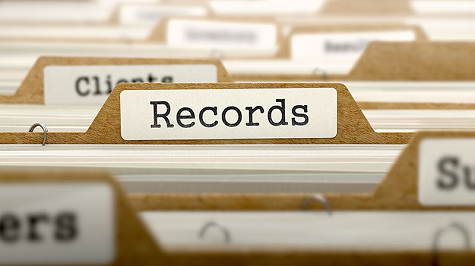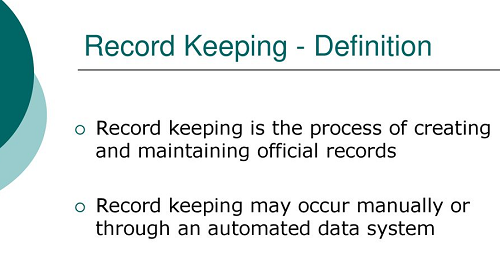Chapter 3: Recordkeeping Overview
Chapter 3: Recordkeeping Overview
Overview

 Record-keeping refers to the process of systematically collecting, organizing, and storing information or data for future reference or use. In various contexts, record-keeping is essential for compliance, accountability, decision-making, analysis, and documentation purposes. Here are some key points regarding record-keeping:
Record-keeping refers to the process of systematically collecting, organizing, and storing information or data for future reference or use. In various contexts, record-keeping is essential for compliance, accountability, decision-making, analysis, and documentation purposes. Here are some key points regarding record-keeping:
Types of Records: Records can include financial documents, personnel files, customer information, transaction logs, correspondence, meeting minutes, contracts, and more, depending on the nature of the organization or individual's activities.
Legal and Regulatory Compliance: Many industries and businesses are required by law to maintain accurate records for a specified period. These regulations may pertain to tax reporting, financial auditing, employee records, data protection, and other areas.
Accountability and Transparency: Effective record-keeping promotes accountability and transparency within organizations. It allows stakeholders, including management, employees, shareholders, regulators, and the public, to access relevant information and assess the organization's performance, integrity, and compliance.
Decision-making and Analysis: Well-maintained records serve as a valuable resource for decision-making, strategic planning, performance evaluation, and trend analysis. By analyzing historical data and trends, organizations can identify opportunities, mitigate risks, and optimize their operations.
Documentation and Communication: Records serve as documentation of past events, transactions, agreements, and decisions. They provide a reliable reference for internal and external communication, dispute resolution, and legal proceedings.
Data Security and Privacy: Proper record-keeping practices include safeguarding sensitive information and ensuring compliance with data security and privacy regulations. This may involve implementing security measures, access controls, encryption, and data retention policies.
Record Retention: Organizations should establish record retention policies that define how long various types of records should be retained and when they can be disposed of securely. These policies should consider legal requirements, operational needs, and risk management considerations.
Electronic Record-keeping: With advances in technology, many organizations now maintain records electronically using document management systems, databases, cloud storage, and other digital tools. Electronic record-keeping can improve efficiency, accessibility, and data security.
Overall, effective record-keeping is critical for ensuring compliance, transparency, accountability, and informed decision-making across various domains, from business operations to regulatory compliance and personal finance management.
In this Unit, you will be covering the following Sections:
What is Gross Income
Unit Sections:
- Chapter 3: Recordkeeping
- Section 3-1: Average Monthly Expenditures
- Section 3-2: Preparing a Budget Sheet
- Section 3-3: Using a Budget
